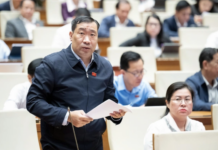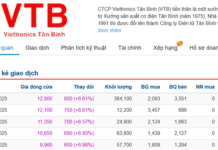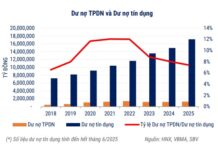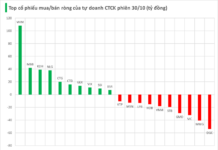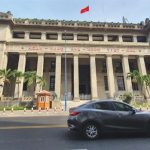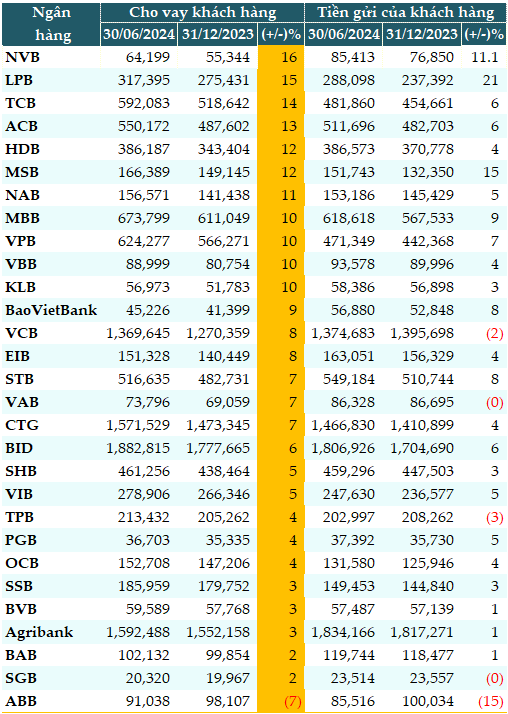The Law on Credit Institutions (amended) 2024, which came into effect on July 1st, introduced several “safeguards” to prevent cross-ownership and the manipulation of banks. However, the effectiveness of these measures largely depends on their practical implementation.
Unveiling Major Shareholders
A notable provision in the amended law requires joint-stock banks to disclose information about individuals or organizations owning 1% or more of their chartered capital, including the percentage of shares held by such individuals and related parties. Additionally, the law reduces the maximum shareholding percentage for institutional shareholders from 15% to 10% and that of individual shareholders and related parties from 20% to 15%.
The law also clarifies that shareholdings exceeding these new limits (i.e., holdings prior to July 1st) can be maintained but not increased, except when receiving dividends in the form of stocks.
As reported by Nguoi Lao Dong journalists, several commercial banks, including Techcombank, LPBank, OCB, VPBank, HDBank, MSB, and Eximbank, have already disclosed information in accordance with the new regulations. Kienlongbank, in particular, has revealed that a total of 22 organizations and individuals hold 1% or more of its chartered capital. Notably, among those listed, only Ms. Tran Thi Thu Hang holds a position on the bank’s board of directors and executive board. Ms. Hang, a current board member and former chairwoman of Kienlongbank, holds over 17.24 million shares, equivalent to 4.72% of the bank’s chartered capital.
Techcombank (TCB) has 13 shareholders, including 6 individuals and 7 organizations, holding 1.84 billion TCB shares, equivalent to a 52.2% stake in the bank. According to Techcombank’s disclosure, four foreign funds—the Government of Singapore Investment Corporation, Morgan Stanley & Co. International Plc, COG Investment I B.V. and its affiliates, and Vesta VN Investments B.V. and its affiliates—each own more than 1%. The Masan Group and its affiliates hold a 15.2% stake in the bank.
Among individual shareholders, Mr. Ho Hung Anh, Chairman of Techcombank, owns over 1.1% of the bank’s chartered capital. His three children collectively hold nearly 12% of the shares…
Eximbank has two individual and three institutional shareholders owning 1% or more of its chartered capital. These include the Gelex Group, Eximbank’s largest shareholder, with a 4.9% stake (over 85.5 million shares). The other two institutional shareholders are Securities Company VIX, with a 3.58% stake, and Thang Phuong Company, with a 3.07% stake.
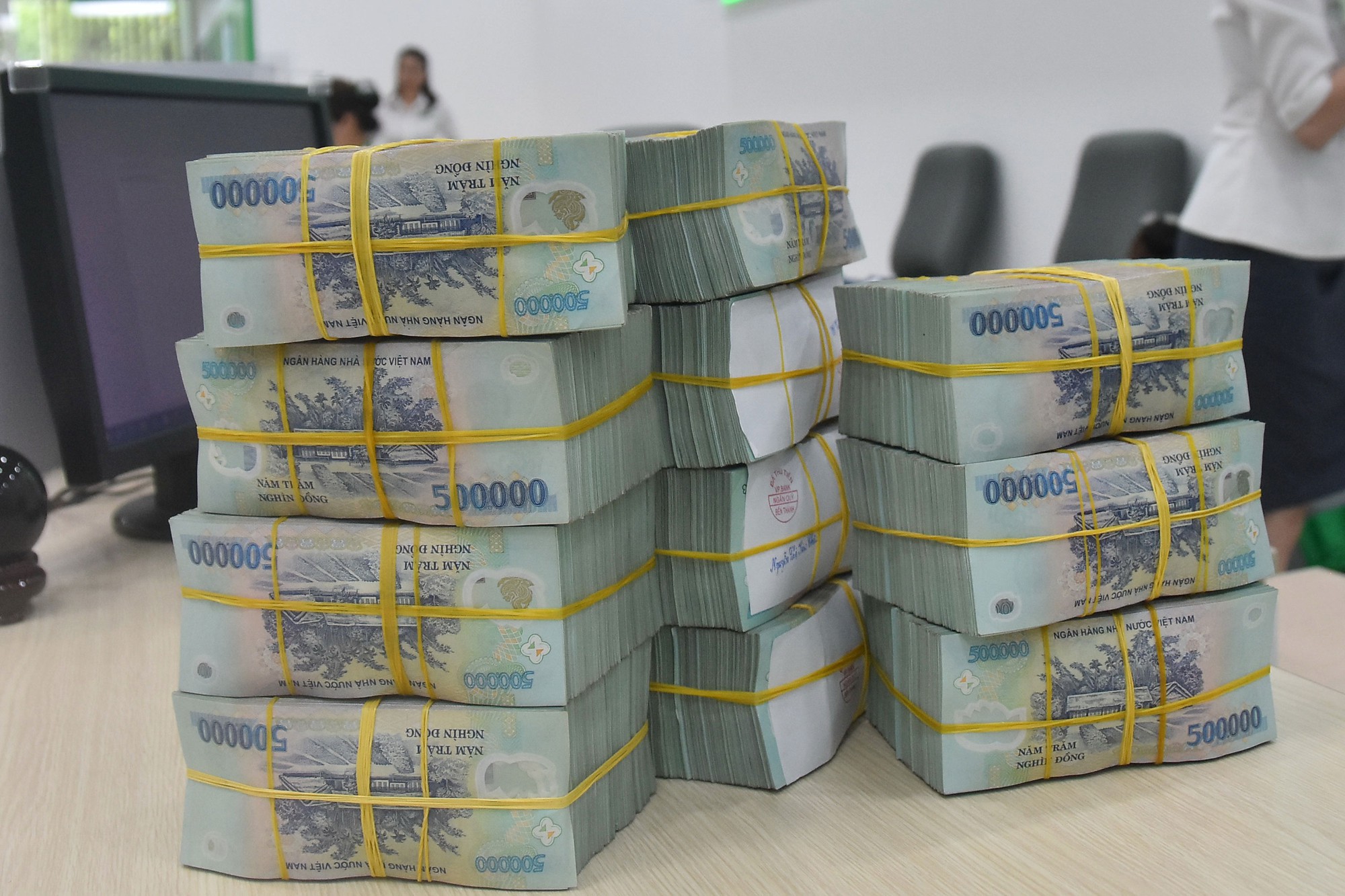
Joint-stock banks are required to disclose information about individuals or organizations owning 1% or more of their chartered capital. Photo: Tan Thanh
Emphasis on Enforcement
Attorney Le Cao of FDVN Law Firm commented that the requirement for joint-stock banks to disclose information about shareholders owning more than 1% of their shares would enhance transparency regarding both minor and major shareholders. This measure is intended to curb the activities of bank acquisition groups and better control related-party shareholdings, thereby reducing cross-ownership.
However, the actual owners of bank shares are not always clear. Several bank-related cases investigated in the past have revealed discrepancies between disclosed and actual ownership percentages, and the practice of nominating shareholders remains a concern. “The Law on Credit Institutions (amended) 2024 provides clear and specific regulations, but ensuring transparency in shareholdings and preventing cross-ownership requires a more determined implementation in the coming time,” Mr. Cao emphasized.
Meanwhile, the former chief supervisor of a Ho Chi Minh City-based bank noted that a recent case involving a major bank revealed that an individual holding only 5% of its chartered capital was actually the bank’s owner. Currently, individuals with large shareholdings can divide their shares among multiple nominees, each holding less than 1%. In such cases, the nominees are not required to provide information to the bank. At an opportune time, the major shareholder can then coordinate with the nominees to elect a representative holding 10% of the shares to the bank’s board of directors, potentially leading to manipulation, especially in credit allocation for related individuals or organizations.
According to attorney Truong Thanh Duc, arbitrator at the Vietnam International Arbitration Center (VIAC), there are indications that cross-ownership among banks has decreased significantly, particularly after the SCB Bank case. However, bank manipulation remains prevalent.
Mr. Duc stated that while the law provides stringent regulations that can fundamentally address the issue from a legal perspective, the deciding factor lies in enforcement. If the gap between the law and its actual implementation persists, not only will the problems of cross-ownership and bank manipulation persist, but they may also worsen. “The legal provisions on shareholding ratios address only 50% of the challenge of curbing cross-ownership and bank manipulation. The remaining 50% depends on related regulations and, more importantly, the enforcement by shareholders, banks, and relevant authorities,” he asserted.
To ensure effective implementation of the regulations on bank shareholdings, financial expert Dr. Nguyen Tri Hieu recommended that the government strengthen its direction and inspection of banks, including enhancing collaboration among ministries and sectors, especially in criminal investigations conducted by the police, to promptly detect intentional violations of shareholding regulations, related-party definitions, or connections between major shareholders of banks and their “backyard” companies. Only then can cross-ownership and bank manipulation be minimized.
Moreover, according to Dr. Hieu, the State Bank of Vietnam should consider imposing severe penalties on banks that collude with shareholders to fraudulently exceed shareholding limits. Concurring with Dr. Hieu, attorney Truong Thanh Duc suggested amending the violation handling regulations to include stringent administrative and criminal penalties, not ruling out the confiscation of shares exceeding the permitted limits.
Clear Identification of Risks
In a recent report to the National Assembly regarding the questioning session, the State Bank of Vietnam acknowledged that, over the years, it has continued to improve the legal framework and resolutely implement solutions to prevent and handle violations related to exceeding shareholding limits, cross-ownership, and improper lending and investment practices as part of the restructuring of credit institutions. However, controlling cross-ownership between non-banking companies and banks is challenging when major shareholders and their related parties deliberately conceal their ownership by nominating individuals or organizations to hold shares on their behalf, thereby bypassing legal regulations. This situation may lead to the bank being influenced by these shareholders, creating a lack of transparency and openness in its operations.
Fighting Cross-Ownership: Impossible to “Take Tangibles to Treat Intangibles”
The recent amendment to the Credit Institutions Act, passed by the National Assembly during an extraordinary session, has introduced several measures to address cross-ownership, manipulation, and domination of credit institutions. However, it is challenging to “make the intangible tangible”! To prevent cross-ownership, it is crucial to enhance the effectiveness of inspections and supervision.










